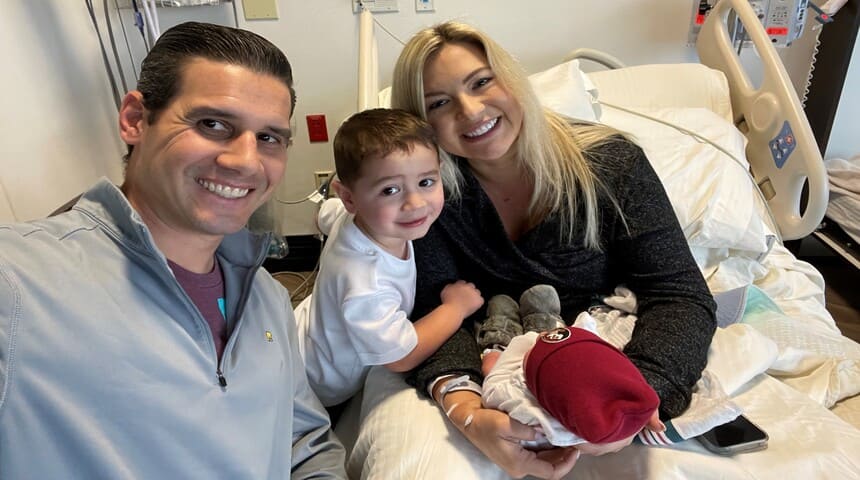Miscarriage is unfortunately very common and yet not talked about enough, leaving many women unsure what to do.
Let’s discuss some strategies on how to recover both physically and emotionally, while keeping in mind that the process looks different for every person.
Physical Recovery After a First-Trimester Miscarriage
As many as 16 percent of all pregnancies in the U.S. end in miscarriage or stillbirth, and miscarriage is most common in the first trimester.
A miscarriage may pass spontaneously, with medications or surgery. You can discuss with your doctor and decide which option works best for your body. Most first trimester miscarriages complete within one month. There may be more risks if it takes longer.
The physical recovery after a first trimester miscarriage usually is not complicated. After you miscarry, you likely will have a menstrual cycle in one to two months. At that point, you can try to conceive again if you are ready. If you accidentally conceive before your cycles resume, it’s OK. It doesn’t mean that pregnancy would be high risk.
Physical Recovery After a Second- or Third-Trimester Miscarriage
A loss after 20 weeks of pregnancy is known as a stillbirth. This is much more taxing on your body, and there are higher risks of bleeding and infection. Typically, a delivery in a labor unit or surgery may need to be scheduled. It can be especially traumatic to be in the hospital for a reason other than what you had pictured. Some hospitals have separate areas for women undergoing these procedures so that they don’t have to be in the maternity ward.
One of the hardest parts of recovering after a stillbirth is that your body will still respond as if you had a normal pregnancy. You will:
- Have cramping after delivery.
- Experience a risk of hemorrhage.
- Require a longer time for your body to return to normal.
- Experience shifts in your hormones.
- Need more time before your menstrual cycle normalizes again.
- Experience discomfort as your breasts will become engorged with milk. This can be both physically uncomfortable physically and emotionally difficult.
You may take pain medication if you need it. And you can discuss with your doctor some options to stop the milk supply. You also might want to apply ice packs to your breasts to reduce pain and discomfort.
You should wait until your body is fully recovered before trying to conceive again. Your doctor may review the causes of stillbirth and risks of it happening in a future pregnancy.
Emotional Recovery
For most women, this is the far more challenging part of a miscarriage. It’s very difficult to reconcile where you are at with all the expectations you had after becoming pregnant. Consider these steps to get through it:
Remove blame. You may feel like you are letting your partner, your family or yourself down by not fulfilling this plan for a baby. The biggest thing that you need to remind yourself of is that you did nothing to cause this. You did nothing wrong. Most miscarriages are due to chromosomal abnormalities that occur as part of nature. It’s common to want to know why the miscarriage happened, but sometimes there isn’t always an answer — and that can be hard to accept.
Gather support. A miscarriage can be very difficult to deal with emotionally, so it can help to have a support group, therapist or grief counselor to talk to. It doesn’t matter at which stage it occurred, it’s OK to get help.
If the miscarriage happened in your second or third trimester, it can be even harder to process. You’ve had more time to think about the baby and imagine the future. Plus, there’s the idea that miscarriage is unlikely after the first trimester, so many women think they’re past the risky time when they reach the second trimester.
Give Yourself Time. It helps to simply acknowledge that this is happening. Facing a miscarriage can be shocking. Give yourself time to absorb the information.
There is no set amount of time that it takes to emotionally process a miscarriage. There will be days where the grief is heavy and other days where you feel more up for activities.
You may want to go back to work sooner than you may have guessed, or you might need extra time to grieve. Some women respond by getting pregnant right away.
Seeking Answers
After a miscarriage, it’s common to want to know why. At your hospital, you can request a workup, which includes lab tests to screen for medical reasons. This may be especially helpful if this is not your first miscarriage.
Family and Friends
Keep in mind that you decide how much you share with friends and family. You don’t owe anyone answers simply because they ask. This can be a time to err on the side of privacy.
Your partner and you other children, if you have them, may also need time to process.
If you do have other kids, you may want to sit down and have a discussion with them when you are ready. It can help to tell them something such as, “The baby is not coming home and it’s OK to be sad.” They will likely have questions and may even benefit from talking to a therapist.
Do not feel like you have to hold it together for the family. Remember that the priority is for you to take care of yourself through this process.
Choose to Stay in Touch
Sign up to receive the latest health news and trends, wellness & prevention tips, and much more from Orlando Health.
Sign Up





